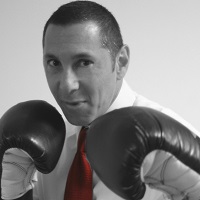Falcon
NOT FOR REPRINT
5 Great Habits to Grow Your Business
Best Practices May 21, 2018 at 01:32 PM
Share & Print
I was flying high! I had just spoken at an event in Hoboken, New Jersey. Home of Frank Sinatra and the first officially recorded game of baseball. Not to mention more bars in 2.01 square miles than probably anywhere. The room where the event was held could not have been better. Right on the water, facing the New York City skyline, sun glaring in on a picture perfect Friday morning as runners went by before taking on their morning commute. Business people up bright and early for a meeting chatting away and the smell of coffee in the air. (Related: 3 Ways to Use a New LinkedIn Business Networking Survey) After the meeting, I was driving out of Hoboken heading to, well, another meeting. Still flying high, I took in the moment as I slowed and stopped at what seemed like every street corner. At one of those street corners I was stopped at a light and noticed a man walking on the sidewalk to my right. He was probably in his early fifties and really fit. His arms, chest, and neck were just chiseled. The sun seemed to reflect off his muscles, which is why he caught my eye. He was wearing an untucked button down shirt with no sleeves, shorts, sneakers, and a backpack over his shoulder. He didn't seem to be in any particular hurry to get anywhere. The man could have been a local probably running an errand or out for his morning coffee. Or coming from the gym. Stopped at my red light, I found myself staring at this guy for the duration of the stop. I'm not sure why. If I had been walking by him on that sidewalk, I would have smiled and said good morning to him. I know he would have responded back with a smile. He had that kind of face. A nice face. A nice smile. Probably a nice conversation. But, idle at that red light, I just stared. I imagined what his life might be like. What he did for work. How long he lived in town. Was he born here? Is this part of his daily routine? Is he a nice guy? Why does he look so good? What does he do every day to keep himself in great shape? Is he happy? As I stared, I was probably smiling the whole time. Then he stopped walking. And put his backpack down. Then reached into his pocket and out came a pack of cigarettes. As smooth as silk he lit the cigarette, took a puff, slipped into his backpack, and continued on his way. Like he has probably done a million times. The light turned green and I was out of Hoboken. And I shook my head. How many people do you know that have so much to offer but bad habits prevent them from being their best? I can't tell you how many sales professionals I see that look so good, come across so well, work for such great companies, and yet don't do what it takes to run a healthy business. What holds you back? I see it all the time with sales producers in broker dealers, insurance companies, private equity firms, real estate offices, and sales teams from a variety of industries. What's even worse is when the boss has bad habits. That tells the sales team that it's acceptable to behave in a certain way. Anyway, here are five great habits to pick up if you're serious about growing your business!
 Michael Goldberg is a speaker, consultant, and the founder of Knock Out Networking. He's also the author of "Knock-Out Networking!"
Michael Goldberg is a speaker, consultant, and the founder of Knock Out Networking. He's also the author of "Knock-Out Networking!"
- Get there early.
- Get into a daily routine that works.
- Be prepared.
- Have an agenda for meetings.
- Be mindful of time.
 Michael Goldberg is a speaker, consultant, and the founder of Knock Out Networking. He's also the author of "Knock-Out Networking!"
Michael Goldberg is a speaker, consultant, and the founder of Knock Out Networking. He's also the author of "Knock-Out Networking!" NOT FOR REPRINT
© Touchpoint Markets, All Rights Reserved. Request academic re-use from www.copyright.com. All other uses, submit a request to [email protected]. For more inforrmation visit Asset & Logo Licensing.
Featured Resources
View All
Sponsored by Axos Advisor Services
Integrated Banking Solutions: How To Enhance Client Services and Grow Your Business

Sponsored by Optifino
Three Macro Trends Impacting Long-Term Care: Trends, Solutions & Client Conversations

Sponsored by Vanilla
The Missing Piece: Why Advisors Who Skip Estate Planning are Failing Their Clients







